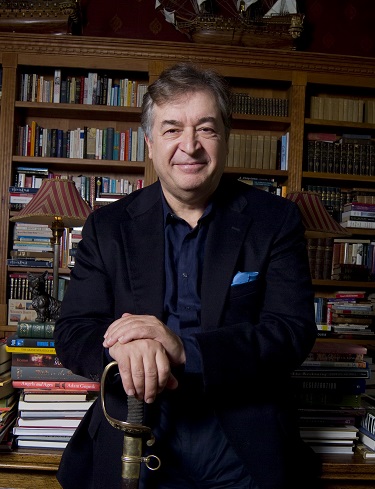
Ron Maxwell
His epic Civil War films Gettysburg (New Line Cinema, 1993) and Gods and Generals (Warners, 2003) have established Ron Maxwell as the cinema’s leading interpreter of that complex, lethal, heroic period in American history. His 2013 film Copperhead freshly extended that mural into the more intimate realm of small-town American life, where the conflicts hundreds of miles from the battlefields are no less vigorous or heart-breaking.
Critics have, at times, quarreled with his films for honestly representing – without irony – the now obsolete views of various participants. Yet for Maxwell, this refusal to be superior-in-retrospect is the whole point: “Whatever we believe today sheds no useful light at all on the dramas of the 1860s. If anything, the direct opposite is true – what people believed then has made us who we are. If we want to understand those who made history, then we need to enter their moral universe, not impose ours on them.”
The late Roger Ebert saw beyond such surface controversies and wrote with deep appreciation for Maxwell’s pursuit of internal and external accuracy: “Gettysburg avoids all war movie clichés. There are sequences so desperate, bloody and protracted that for once we sense the sheer physical exhaustion of combat, the combination of fear, fatigue and determination. We experience the horrifying reality of battle itself.” Mr. Ebert did not live to see Copperhead, but his protégé, Matt Zoller Seitz, wrote at RogerEbert.com, that the movie is “intriguing as a study of just how hard it is to hold an unpopular opinion without being demonized and abused.” National Review in turn praised Gods & Generals – “The film is about conflicting ideas of patriotism, God, personal conscience, and history.”
As for Copperhead, Maxwell has said: “My previous pictures focused on officers and leaders, but, in reality, the war was fought by teenage boys, most from small towns whose families ended up devastated by the war even if no battles were fought nearby. Within each society, North and South, there were many factions. You had Southerners with no interest in owning slaves, or seceding from the union. To the north, you had differences of opinion that were just as fractious, even violent.”
History has been of primary interest to Maxwell throughout his life, and so has the nature of American identity. Born and raised in Clifton, New Jersey, son of a World War II veteran and his French war bride, it is only fitting that his graduate thesis film at NYU Film Institute was an adaptation of Albert Camus’ The Guest Maxwell with Mark Hamill and Kristy McNichol and that his major debut as a director was a tender but unsentimental love story set in his parents’ era that secured him an Emmy® nomination: Verna: USO Girl (PBS, 1978). Frank Rich in Time magazine was delighted by Maxwell’s appetite for authenticity: “Maxwell has not stinted on important details: he shot the war scenes on location in Europe and enlisted Broadway choreographer Donald Saddler and burlesque comic Joey Faye to help create the vaudeville numbers. … Verna’s troupe is the kind of company that gives the small screen the illusion of depth.”
Maxwell’s subsequent first theatrical film Little Darlings (Paramount,1980) was a box-office hit that starred Tatum O’Neal and Kristy McNichol. This paved the way to The Night the Lights Went Out in Georgia (AvcoEmbassy, 1981), of which Arthur Knight in The Hollywood Reporter wrote, “Director Ronald F. Maxwell … has a real instinct for when to put plot on the back burner and let the atmospherics enrich his movie. The seedy, smoke-filled roadhouses, the bleak motels, the menacing emptiness of a small Southern town after midnight – all of these have been eloquently rendered …and expertly mobilized by Maxwell to enhance the film’s texture and sense of verisimilitude.”
Ron Maxwell directed Robert Duvall in Gods And Generals, Disney’s Parent Trap II, and Twentieth-Century Fox’s Kidco followed, during which Maxwell persevered in his 15-year quest to see Gettysburg made. Premiering in 1993, Richard Schickel wrote in Time magazine, “That cinematic rarity, an intelligent epic…the four hour epic speaks well for writer-director Ronald Maxwell’s sober intentions and very creditable achievements in this film – the acuity of the film’s best characterizations, the vaulting scale of its design and, above all, its belief that history, besides being instructive in itself, can and should be a great movie subject.”
He is by no means finished with history as his preoccupation – optioning and co-writing (with Alan Geoffrion) a screenplay from Speer Morgan’s 1979 book Belle Starr, about the woman who rode with Jesse and Frank James and was known as “Queen of the Outlaws.”
In 2014, Maxwell continues pre-production on an epic trilogy of movies from his own original screenplays – Joan of Arc: The Virgin Warrior and is developing a motion-picture set during the Highland Clearances of late 18th Century Scotland. With Ron Maxwell’s Civil War Classics, he continues in his search for the great stories from America’s defining conflict, as creatively envisioned by its greatest authors.
He is a member of the Writers Guild of America, the Directors Guild of America, and the Academy of Motion Picture Arts and Sciences. He is the recipient of an honorary Doctor of Letters degree from Concordia College.
